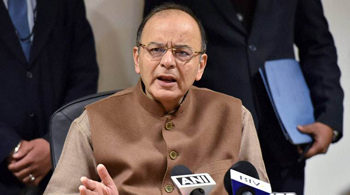New Delhi, Dec 20: The Reserve Bank was fully prepared to deal with currency shortages post demonetisation and has enough currency in its chests to last "far beyond" December 30, Finance Minister Arun Jaitley said today. "There was full preparedness. There was not a single day when RBI had not released adequate currency to banks. There was a certain level of currency that was to be released and there was full preparedness for it," Jaitley told reporters.

"The currency which got printed might have gone to Post Offices and from there to banks and again back to currency chest so there could be double counting and scope for inaccuracies. So we do not want to guess the figures (of currency in circulation)," he said. Economic Affairs Secretary Shaktikanta Das said the currency situation has considerably improved since November 8 and there is adequate currency with RBI to meet the demand till December 30.
While announcing the demonetising the Rs 500 and Rs 1,000 notes on November 8, Prime Minister Narendra Modi had asked holders of such notes to deposit them in banks. He said notes of Rs 500 and Rs 2,000 with new design and more security features were being introduced in the market. The scrapped currency made up for 86 per cent or over Rs 15.45 lakh crore of notes in circulation as on November 8.
Before the announcement of demonetisation, the government had already arranged for the printing of 200 crore Rs 2,000 notes, or roughly about Rs 4 lakh crore in value. They were the first set of notes to be circulated. Thereafter, a new Rs 500 note was introduced and now all the four printing presses of RBI at Dewas in Madhya Pradesh, Nashik in Maharashtra, Salboni in West Bengal and Mysuru in Karnataka are working overtime to replenish the exhausted currencies.
Post demonetisation use of all parallel and alternative modes of digital payments, credit/debit cards have increased significantly, Jaitley said. "There is significant jump in digital transactions, by over 300 per cent in some cases. Where base was low, it is 1,500 per cent".
Replying to queries on curbs on deposit of old currency notes by RBI, he said people should go and deposit the now- defunct notes in one go as repeat deposits raise doubts. He added: "Today there are no exemptions... Now there is no further scope of earning old currency so those who have got old currency must go and deposit in one go.
"Therefore if somebody goes everyday and deposit old currency it raises suspicion. How is he getting everyday? As long as exemptions existed there was scope for getting old currency, but once the exemptions have been lifted if you have old currency go and deposit in one go." With nearly Rs 13 lakh crore, out of the Rs 15.4 lakh crore worth of Rs 500 and Rs 1,000 notes junked, already deposited in banks, RBI yesterday changed rules to mandate that individuals can deposit over Rs 5,000 in old currency bills only once until December 30 and that too after explaining why it had not been done so far.
Clarifying the rules, Jaitley later in night had said no questions will be asked if any amount of junked currency is deposited in one go but repeated deposits may raise queries. "If they go and deposit with bank any amount of currency no questions are going to be asked to them and therefore the 5000 rupee limit does not apply to them if they go and deposit it once.
"But if they are going to go everyday and deposit some currency, same person, that gives rise to suspicion that where is he acquiring this currency from. In that event a person may have something to worry about. Therefore everyone is advised whatever old currency you have please go and deposit it now," Jaitley had said.








Comments
Add new comment